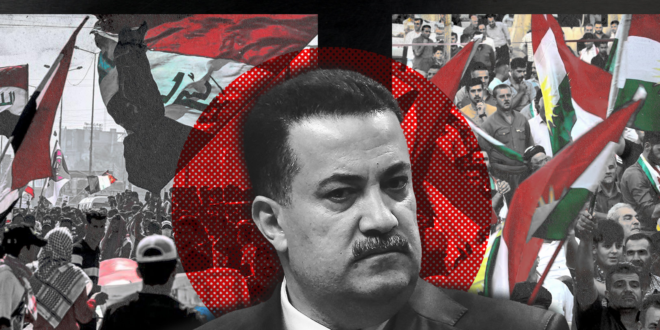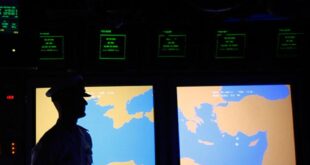What began as a localized political pact to help fix relations between Baghdad and Erbil has spiraled into renewed ethnic turmoil in Kirkuk and a resurgence of Kurdish independence aspirations.
An agreement reached between the governments of Baghdad and Erbil to relocate the Iraqi army from its headquarters in Kirkuk – a multi-ethnic city in Iraq’s north – ignited a wave of protests last month.
Thousands of Arab nationalists and Turkmen residents staged sit-ins and established makeshift camps in front of the Iraqi Joint Operations Command building in late August. They were reacting to a directive issued by Iraqi Prime Minister Muhammad Shia al-Sudani to hand over control of the headquarters to the Kurdistan Democratic Party (KDP).
The prime minister’s decision was part of a political arrangement struck by the Coordination Framework – Iraq’s largest Shia political bloc – prior to the formation of the current government.
Kirkuk crisis
The agreement sought to transfer authority over Kirkuk’s headquarters to the Kurdish parties that had vacated the area in 2017, while the Iraqi army and the Popular Mobilization Units (PMU) would continue to maintain security responsibilities for the area.
Nonetheless, the move was met with great dissatisfaction among Kirkuk’s Arab and Turkmen communities, who were apprehensive about a resurgence of Kurdish influence in the oil-rich city. Demonstrators took to the streets, obstructing the Erbil-Kirkuk highway in protest, and conducting a sit-in around the Joint Operations Command headquarters.
Concurrently, the KDP organized a counter-protest on 2 September, mobilizing hundreds of its supporters. This counter-protest escalated into clashes with both the protesters and security forces in the vicinity of the headquarters. The unrest then rapidly spread to the predominantly Kurdish areas of the city, resulting in at least three fatalities and injuring around 16 individuals.
The following day, Sudani declared a curfew in the city and issued a statement calling upon “all political parties and social and popular activities to ward off strife and maintain security, stability, and order in Kirkuk Governorate.”
On the same day, the Federal Court in Iraq decided to temporarily suspend the implementation of the prime minister’s order to evacuate the joint operations headquarters. The court’s decision also provoked strong reactions, with KDP leader Masoud Barzani expressing concern about what he called “these unacceptable actions that will have bad repercussions.”
“Shedding the blood of our children in Kirkuk will have a heavy price,” he added, while Kurdistan Regional Government (KRG) Prime Minister Masrour Barzani described the court’s decision as a “farce.”
Reviving Article 140
On 28 November, 2022, Iraqi Minister of Justice Khaled Shwani, who also acts as the representative of Kurds in the central government, announced that Sudani had approved the reconstitution of the Supreme Committee to activate Article 140 of the Iraqi Constitution – an article intended to resolve the issue of who controls Kirkuk and the so-called disputed areas between the Kurdistan Region and its neighboring provinces, Nineveh, Diyala, and Salah al-Din.
The implementation of this article is a point of contention between the Kurds, who advocate for its enforcement, and the Arabs and Turkmen, who oppose it.
Article 140 outlines a three-stage process for determining the future of these disputed areas. It begins with the return of residents who were relocated to the city during Saddam Hussein’s rule back to their original areas, for which they will be financially compensated.
A population census of these areas is to be conducted then, followed by a popular referendum to determine whether the lands should fall under the authority of the government in Baghdad or Erbil.
A former official in the Article 140 Implementation Committee, who asked to remain anonymous, discloses to The Cradle that the compensation to be paid to the relocated Iraqis, per Article 140, amounts to an astronomical $3 billion.
Jawad al-Ghazali, a member of the House of Representatives representing the State of Law bloc, tells The Cradle that Kurdish efforts to activate Article 140 are driven by a desire to gain control of Kirkuk because of its significant natural resource wealth. He warns that implementing the article “may lead to civil war.”
Legal expert Ali al-Tamimi points out that the highly contentious article, approved while Iraq was under foreign occupation and rule, remains ambiguous more than 18 years later. For one, it does not specify whether the administrative units it encompasses refer to the governorates as a whole or specific administrative divisions within them.
While Kurdish political parties contend that the non-implementation of Article 140 is an underlying reason for all the strife and clashes in these areas, it is the adoption of this article that could actually tear Iraq apart.
The significance of Kirkuk
Kirkuk Governorate is located approximately 240 km from Baghdad, and its proximity to the Kurdistan Region’s provincial borders contributes to its diverse religious and ethnic composition.
The governorate comprises four primary administrative units: Kirkuk District, the central city inhabited by a mix of Arabs, Turkmen, and Kurds; Hawija District, predominantly Sunni Arab; Daquq District, with a Turkmen and Kurdish majority; and Dibs District, which includes a majority of Sunni Muslim Arabs in its central and southern areas and a Kurdish majority in its northern regions.
The estimated population of Kirkuk stands at approximately 1,075,000 people. The city has experienced demographic changes over the years, particularly during Saddam Hussein’s era when its name was altered, and parts of it, such as Tuz Khurmatu, were incorporated into Salah al-Din Governorate.
Following the 2003 US-led invasion and occupation of Iraq, the two major Kurdish political parties – the KDP and the Patriotic Union of Kurdistan (PUK) – gained significant control over the city. As Iraqi political analyst Hajim al-Hassani describes to The Cradle:
“The city is considered a mecca for the Kurdish parties, not because it is Kurdish as they claim, but because it contains great wealth, as it produces 350,000 barrels of oil per day, in addition to its fertile agricultural land.”
Baghdad retakes Kirkuk
On 12 June, 2014, the 12th Division of the Iraqi Army withdrew from its defensive positions in Kirkuk as ISIS terror troops gained control of the city. According to intelligence and press reports, a meeting took place between division commander Major General Muhammad Khalaf al-Fahdawi and Kurdish Peshmerga forces, during which they agreed that Fahdawi would relocate to the Kurdish city of Sulaymaniyah, handing over control of the division headquarters to the Peshmerga.
Subsequently, on 25 September, 2017, Erbil authorities conducted a referendum on secession in Kirkuk, a move that was fully rejected by Baghdad and various regional and international parties. The following month, the Iraqi government – with critical support from the PMU – launched a lightning-fast military campaign to reassert federal government authority over the governorate and other areas disputed with the Kurdistan Regional authorities.
This operation led to the withdrawal of Peshmerga forces from these areas, some of which they had controlled since 2014 and others following the illegal 2003 US invasion. During this rapid offensive, Iraqi army forces seized more than 33 headquarters of Kurdish parties in Kirkuk, including the primary headquarters of the KDP – still a sensitive issue in light of the recent clashes.
Wasfi al-Asi, the Head of the Arab Front in Kirkuk and a deputy in Iraq’s parliament tells The Cradle:
“It was a big day for the people of Kirkuk when the headquarters of the Kurdistan Democratic Party was recaptured. It was witness to an era of kidnapping and killing of Arab and Turkmen people of Kirkuk, and we will not allow that to happen again.”
Arshad al-Salhi, the leader of the Turkmen Front and also a member of parliament, argues that “not handing over the headquarters is a natural and sound decision, because the land on which it was built belongs to the state and not to the Kurdish parties.”
Many Iraqis make the argument that Kirkuk should be run by Iraqis – not an ethnic group that can threaten the territory’s sovereignty. They invoke the attempt by Kurdistan Region Leader Masoud Barzani to annex Kirkuk through the September 2017 referendum, aligning with the long-standing ambition of Kurdish leaders to establish an independent state.
The Israeli-Kurdish connection
Economic analyst Bassem al-Sharifi explains this viewpoint to The Cradle:
“The Kurdistan government’s control over Kirkuk opens the way to its independence from Iraq, because its wealth is capable of providing sufficient financial resources to meet the region’s needs.”
Barzani’s dogged insistence on holding the referendum surprised many, but political analyst Haider al-Bakri says that motivation became more clear to Iraqis after Israeli Prime Minister Benjamin Netanyahu openly expressed support for Kurdish secession from Iraq.
At that time, Iraqi religious authority Jawad al-Khalisi railed against Israel’s vocal and clandestine support of Kurdish independence from Iraq during a Friday sermon on 22 September, 2017: “The Zionists’ support for the secession project results from their awareness that their destiny is to disappear, and therefore they are working to establish a new Zionist entity.”
The decades-old relationship between Iraqi Kurds and Tel Aviv dates back to 1948, with visible connections in 1965 when Israeli diplomat David Kimhi met with Kurdish leaders and confirmed Israel’s readiness to provide military and financial support for the Kurds’ independence project.
The Israel Kurd magazine, published in Erbil with its main headquarters in Israel, reported that Tel Aviv pledged to transfer 200,000 Kurdish Jews from Israel to Kurdistan – if the region declared independence from Iraq – to contribute to the development of the new state.
Neighboring hegemons Turkiye and Iran recognize Kirkuk’s importance to Israel. After all, Tel Aviv supports Kurdish separatist movements at local and regional levels – in part to encircle the two countries that have substantial Kurdish minorities. As such, both Ankara and Tehran have, in the past, engaged in separate and joint offenses against Kurdish separatist positions in Iraq, in violation of the state’s sovereignty.
The Kirkuk question extends far beyond the borders of Iraq, carrying significant regional implications. Heavily mired in the aspirations of Kurdish leaders, it also entangles influential regional players such as Turkiye and Iran, along with the interests of political actors further afield.
As the future of Kirkuk continues to hang in the balance, it serves as a potent symbol of the persistent challenges, one among many, confronting post-2003 Iraq.
 Eurasia Press & News
Eurasia Press & News




